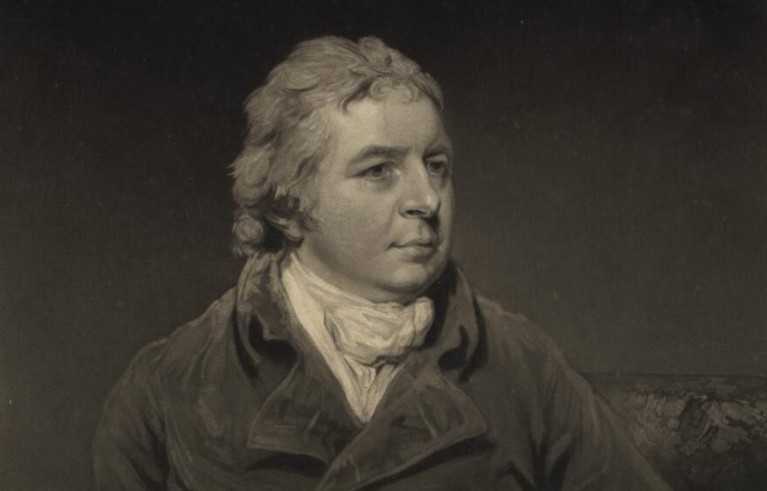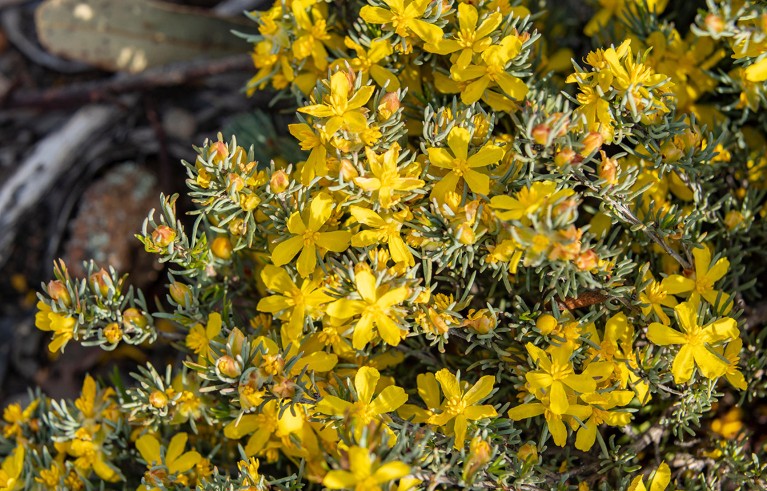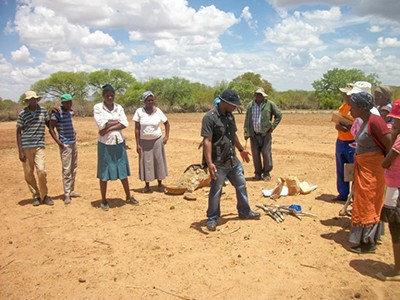
George Hibbert, an eighteenth-century English service provider who profited from the slave commerce and fought abolition, lends his identify to a genus of flowering shrubs.Credit score: Llyfrgell Genedlaethol Cymru – The Nationwide Library of Wales
Plant scientists are set to determine on whether or not to rid their subject of offensive names.
This week, the group that units the foundations for naming plant species will vote on whether or not to rename dozens of organisms whose scientific designations include a racial slur, in addition to to rethink different offensive names, corresponding to those who acknowledge colonialists or individuals who advocated for slavery.
The votes on the Worldwide Botanical Congress in Madrid mark the primary time that taxonomists have formally thought-about rule adjustments to take care of species names that many individuals discover offensive.
I practice farmers to make use of plant science within the struggle in opposition to local weather change
Advocates of the proposals argue that, as wider society addresses the veneration of individuals accountable for historic injustices, so ought to science. However some on this planet of taxonomy fear that altering names en masse might sow confusion within the scientific literature, in addition to create a ‘slippery slope’ that would threaten any species identify recognizing an individual.
“It’s very unlucky that many of those names are offensive,” says Alina Freire-Fierro, a botanist on the Technical College of Cotopaxi in Latacunga, Ecuador. “To alter the names which have already been printed would trigger a lot confusion.”
Egregious names
Advocates of the adjustments level out that species names and taxonomy guidelines are continually in flux — this week’s assembly will contemplate tons of of proposals to change guidelines for plant names. Eliminating particularly egregious names is a drop within the ocean in contrast with the adjustments that already happen when, as an example, a genetic evaluation splits a single species into a number of species or reveals new relationships between species, say scientists supporting the measures.
“It might be nice to have some mechanism for removing a few of the most offensive names,” provides Lennard Gillman, a retired evolutionary biogeographer and impartial advisor in Auckland, New Zealand.
Each six to seven years, taxonomists meet at a convention referred to as the Worldwide Botanical Congress to think about adjustments to the foundations for naming vegetation, in addition to fungi and algae (a separate group is accountable for animal names). Later this week, members of the Nomenclature Part will vote on two proposals that take care of culturally delicate names.
New plant species are usually named by the scientists who uncover them, with a key requirement {that a} description seems in scientific literature. In the course of the nineteenth and even effectively into the 20 th centuries, the largely European scientists formally naming species discovered within the non-Western world usually acknowledged colonial rulers, such because the politician Cecil Rhodes, and patrons.

Yellow-flowered shrubs referred to as Hibbertia, after anti-abolitionist George Hibbert, are one plant group that some botanists wish to rename.Credit score: Robert Wyatt/Alamy
One of many proposals goals to rename an estimated 218 species whose scientific names are primarily based on the phrase caffra and numerous derivatives — that are ethnic slurs usually used in opposition to Black individuals in southern Africa — and to exchange it with derivatives of ‘afr’ to as an alternative acknowledge Africa. The second proposal, if accredited, would create a committee to rethink offensive and culturally inappropriate names.
Gauging assist
In a poll performed forward of the congress to gauge how a lot assist there may be for the tons of of proposals, almost 50% of voters supported altering the scientific names of vegetation corresponding to Erythrina caffra, generally often known as the coast coral tree, to Erythrina affra. The proposal to create the committee sneaked previous a threshold — receiving fewer than 75% ‘no’ votes — to be voted on this week in-person.
Gideon Smith, a plant taxonomist at Nelson Mandela College (NMU) in Gqeberha, South Africa, expects an especially shut vote for the ‘caffra’ modification, which he and fellow NMU taxonomist Estrela Figueiredo submitted. To cross, the vote requires a 60% super-majority, however the final result will rely upon who attends the congress, in addition to ‘institutional votes’ that enable herbaria such because the Royal Botanic Gardens, Kew, in London to allocate proxy votes to an attendee, says Smith.
“There’s resistance in opposition to these proposals, the worry of throwing plant nomenclature into chaos,” Smith says. However he provides that the upshot of not requiring scientists to make use of a time period that they discover massively offensive far outweighs the minimal sensible penalties of the adjustments. “I can not consider any less complicated solution to eliminate this racial slur.”
Kevin Thiele, a plant taxonomist on the Australia Nationwide College in Canberra, expects that, if his proposal to create a mechanism to take away offensive names is accredited, a comparatively small variety of species names would change. It’s seemingly that the argument for stability in species names can be outweighed solely in instances wherein vegetation are named after “sufficiently egregious” people, he says.
One change Thiele wish to see is to a genus of flowering shrubs, most of which have yellow blooms and are present in Australia, referred to as Hibbertia, with new species routinely found. They’re named after George Hibbert, an eighteenth-century English service provider who profited from the slave commerce and fought abolition. “There must be a method of coping with instances like Hibbert,” he says.
Restricted assets
Alexandre Antonelli, a Brazilian scientist and director of science at Kew, sympathizes with such issues and wish to see a wider dialogue of learn how to improve fairness, range and inclusion within the subject. However he worries concerning the practicalities and unintended penalties of adjustments to naming guidelines, corresponding to who would decide adjustments or how disagreements can be arbitrated. Furthermore, Antonelli argues that restricted assets are higher centered on cataloguing, learning and defending biodiversity. “I wouldn’t be supportive of proposals that derail that course of,” he says.
Some researchers have referred to as for even larger adjustments: an finish to the follow of naming species after individuals1. However that doesn’t appear honest, says Freire-Fierro, and will rob researchers within the world south of the chance to call species they uncover after native scientists and Indigenous leaders, or to lift funds for conservation.
Even when the 2 proposals being thought-about don’t cross, Thiele and others say that the problems they’re trying to handle are usually not going to go away. Gillman, as an example, wish to see future botanical congresses contemplate changing some current plant names with longstanding names utilized by Indigenous teams. “It might be very cool in the event that they handle to get one thing over the road,” he says of this week’s vote. “Change usually occurs incrementally.”



